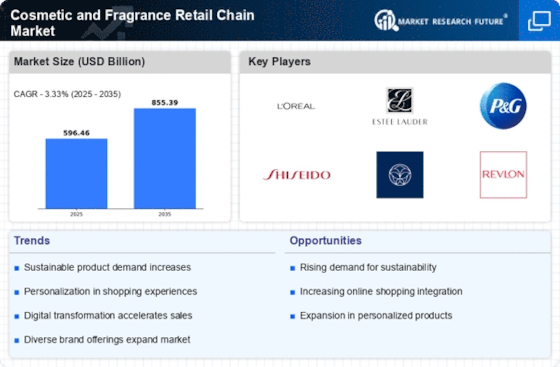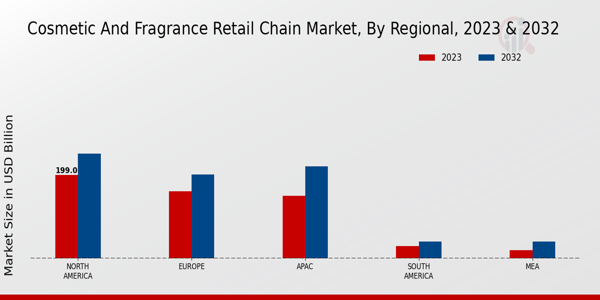Market Growth Projections
The Global Cosmetic and Fragrance Retail Chain Market Industry is poised for substantial growth, with projections indicating a market value of 300 USD Billion in 2024 and an anticipated increase to 500 USD Billion by 2035. This growth trajectory suggests a robust demand for cosmetic and fragrance products across various demographics. The industry is expected to experience a CAGR of 4.75% from 2025 to 2035, reflecting the ongoing evolution of consumer preferences and market dynamics. The combination of innovative product development, effective marketing strategies, and a focus on sustainability will likely contribute to this positive outlook.
Expansion of E-commerce Platforms
The Global Cosmetic and Fragrance Retail Chain Market Industry is witnessing a significant transformation due to the rapid expansion of e-commerce platforms. Online sales channels provide consumers with greater access to a diverse range of products, often at competitive prices. In 2024, e-commerce is expected to account for a substantial portion of the market, enhancing convenience and allowing brands to reach a global audience. This shift is likely to contribute to the projected market growth, with an anticipated increase to 500 USD Billion by 2035. The convenience of online shopping, coupled with targeted marketing strategies, indicates a promising future for e-commerce in this sector.
Rising Awareness of Personal Grooming
The Global Cosmetic and Fragrance Retail Chain Market Industry benefits from an increasing awareness of personal grooming and self-care among consumers. This trend is particularly pronounced among younger demographics, who view cosmetics and fragrances as essential components of their daily routines. The market's expansion is supported by a growing emphasis on personal appearance and well-being, with consumers willing to invest in high-quality products. As a result, the industry is projected to grow at a CAGR of 4.75% from 2025 to 2035, reflecting the sustained interest in personal grooming and the ongoing development of innovative products.
Growing Consumer Demand for Natural Products
The Global Cosmetic and Fragrance Retail Chain Market Industry experiences a notable shift towards natural and organic products. Consumers increasingly prioritize ingredients that are perceived as safe and environmentally friendly. This trend is reflected in the rising sales of brands that emphasize sustainability, with many companies reformulating their products to meet these preferences. The market's value is projected to reach 300 USD Billion in 2024, driven by this demand for transparency and ethical sourcing. As consumers become more informed, the industry adapts, suggesting that the focus on natural ingredients will likely continue to shape product offerings in the coming years.
Diversity and Inclusivity in Product Offerings
The Global Cosmetic and Fragrance Retail Chain Market Industry is increasingly characterized by a focus on diversity and inclusivity in product offerings. Brands are recognizing the importance of catering to a wide range of skin tones, hair types, and cultural preferences. This shift not only enhances brand loyalty but also attracts a broader consumer base. Companies that prioritize inclusivity are likely to see a positive impact on their sales and market presence. As the industry continues to evolve, the commitment to diversity in product development will likely play a crucial role in shaping future trends and consumer expectations.
Influence of Social Media and Digital Marketing
The Global Cosmetic and Fragrance Retail Chain Market Industry is heavily influenced by social media and digital marketing strategies. Platforms such as Instagram and TikTok have become vital for brand promotion, enabling companies to engage directly with consumers. Influencer partnerships and user-generated content play a crucial role in shaping consumer perceptions and driving purchasing decisions. This trend is likely to bolster market growth, as brands that effectively leverage social media can enhance their visibility and appeal. As the industry evolves, the integration of digital marketing strategies will likely remain a key driver of sales and brand loyalty.




